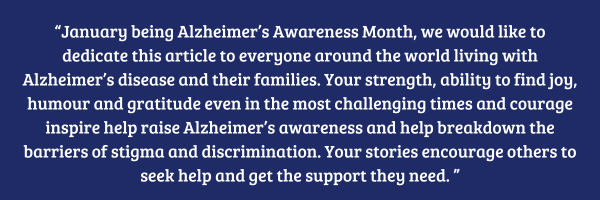
Alzheimer’s disease is a progressive condition that results in a deterioration of cognitive abilities, with symptoms inevitably worsening over time. As the disease advances, individuals increasingly rely on their caregivers for support.
According to a study published in the American Journal of Geriatric Psychiatry, a “lack of knowledge about dementia causes caregivers to overestimate a patient’s abilities, which may lead to greater anger, frustration, and depression.” Providing caregivers with information and expertise on dementia can alleviate certain adverse experiences and emotions associated with caregiving. Being well-informed enables better readiness to handle unavoidable challenges in various aspects such as physical, mental, emotional, financial, and social dimensions.
After the Diagnosis: Preserving Dignity and Leaning into the Difficult Emotions
While individuals in all stages of dementia will need different levels of assistance, it’s crucial to recognize that they can also offer valuable support to their caregivers and family members. Initiating challenging conversations early on, during the initial stages when the person can comprehend, communicate, and engage in decisions about their care, is essential. This approach is vital for upholding their rights, respecting their preferences, and safeguarding their dignity.
In my experience as a Dementia Consultant and Educator, involving individuals with Alzheimer’s disease in discussions and decision-making processes serves to validate their “value,” not only to themselves but also to their family and the people around them. This instills in them a sense of purpose and helps them to feel in control, which is equally, if not more, crucial for their well-being compared to being solely cared for and “protected” by their caregivers.
Finding the courage to lean into your emotions, your doubts, fears, sadness, and even grief to the person you are caring for can be a healing or “therapeutic” experience on both sides. This process establishes a secure environment for communication and might prompt the individual to disclose their own concerns and anxieties regarding their diagnosis and the future. Sharing not only moments of joy but also difficult and challenging emotions is equally crucial for a person’s overall well-being.
As caregivers, you can be strong for the person you are caring for. Nonetheless, it’s a reciprocal relationship. Permitting the person you are caring for to lend an ear, offer solace, and provide comfort during difficult moments preserves their significance and role in your life, whether they are a parent or spouse, for as long as they are able.
Keep in mind that the individual you’re taking care of is an adult with a rich life history and the potential to continue leading a purposeful and significant life. They bring decades of life experience, stories, and wisdom that can positively impact others. Their narratives, adventures, life teachings, accomplishments, and setbacks are integral aspects of their identity. Allow them to be acknowledged for their life history rather than being solely defined by their diagnosis. This is the approach to recognizing the person beyond the impact of the disease.
The “Normal” Emotions to Expect When Caring for Someone with Alzheimer’s Disease and Other Related Dementias
Caring for someone with dementia can trigger a rollercoaster of emotions, from compassion and patience to frustration and sadness. Witnessing a loved one struggle with memory loss and other cognitive decline can evoke a profound sense of loss and grief. Moments of clarity may be heartwarming, but the constant unpredictability can be emotionally challenging. Caregivers often navigate a delicate balance, finding joy in small victories while grappling with the grief of gradual changes.
The key is to not be too hard on yourself. It’s inevitable that caregivers will feel guilt. It’s powerful to know we can control our guilt to a more reasonable level. Whatever you are feeling, it’s “normal.” It’s your “new normal.” You are not alone in feeling tired, alone, lonely, depressed, scared, angry, resentful. Whenever you do, just remember to reach out, call a trusted friend, or attend a support group.
How to Avoid Conflict and Maintain Peace in the Relationship
It’s ideal for Caregivers who provide support to individuals with dementia to adopt a fresh perspective and acquire additional communication skills to maintain harmony and alleviate the stress and burnout associated with caregiving. Our online courses, “3 Things Not to Say When Caring for Someone with Dementia,” and “Ways to Reduce Conflict in Dementia Care” provide useful scripts and strategies for supporting someone with dementia.
Asking for Help and Connecting with a Community of Support
To effectively care for individuals with Alzheimer’s disease and related dementias, caregivers must adopt a long-term and sustainable mindset. Their Community of Support may include:
- Family members and trusted friends share caregiving responsibilities, aiding with tasks (such as grocery shopping and attending appointments), contributing financial assistance, or offering emotional support.
- Church groups for spiritual guidance, addressing questions about death and grief, and providing emotional and prayer support in challenging times.
- Support groups, whether in person or online, offer a sense of community and alleviate feelings of loneliness, anxiety, depression, and social isolation. (We have online support groups available. Learn more at www.DementiaSolutions.ca )
- Other healthcare professionals, counselors, and experienced dementia experts/consultants to collaboratively find solutions for challenging dementia-related behaviors.
Making Time and Space for Self-care (Getting External Support)
Initiating a dialogue with the person under your care regarding the potential use of adult daycare centers and homecare providers is crucial, ideally starting early in the caregiving journey. Conduct thorough research on available services in your local area and seek recommendations from friends who have utilized such services.
Caregivers require dedicated time for respite and self-care to sustain their ability to provide support. Start by identifying the suitable home care company or caregiver that aligns well with your loved one’s needs.
If gaining the acceptance and support of your loved one poses a challenge, we suggest consulting with dementia experts or even the home care company for helpful advice and creative solutions.
Meaningful and Informed Caregiving
Understanding facilitates proactive caregiving, alleviating stress for both the caregiver and the individual affected. Informed caregiving fosters a stronger connection, allowing for empathy, understanding, and compassion toward the unique experiences of those with dementia.
While being a caregiver for someone may have its challenges, it also presents opportunities for meaningful moments of profound connection. In the face of cognitive decline, caregivers become lifelines, offering love and support. Despite the difficulties, caregivers discover a depth of human resilience and unconditional love they might not have otherwise experienced.
At Dementia Solutions, we’ve made it our mission to demystify dementia behaviour and continue to explore person-centred, creative, non-pharmacological solutions to manage dementia-related behaviours. We believe that awareness creation and skill-building through education is the most effective and powerful tool we have to promote and maintain the well-being of both the person with dementia and their caregiver. You may find this Meaning Behind the Behaviour Story helpful.
If you need support in your caregiving experience or would like to learn more about our educational opportunities, please reach out to us at Info@DementiaSolutions.ca and we would be more than happy to support you.
DISCLAIMER:
The contents of this blog are provided for information purposes only. They are not intended to replace clinical diagnosis or medical advice from a health professional.



